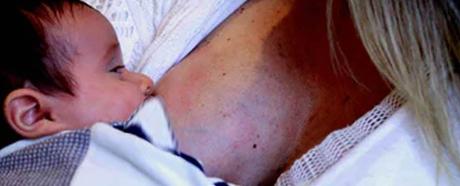
Breastfeeding is an amazing experience for both mom and baby, but it can also bring some challenges. When you first begin breastfeeding, you will notice your breasts become large and swollen. Sometimes this is due to being overfilled with milk, which can become very painful.
What is Engorgement?
Approximately 2-5 days after the birth of your baby, you may notice that your breasts feel full, heavy, and swollen.
This change in your breasts is known as engorgement and is caused by the swelling of breast tissue as milk production begins and your milk ducts fill. Although it may feel uncomfortable, it is actually a positive thing as it typically occurs when your breasts first transition from colostrum to milk.
Your breasts can also become engorged if an insufficient amount of milk is removed from them.
This may occur if you miss several nursings (and do not use your breast pump) or if your baby is not nursing vigorously enough.
Engorgement may make your breasts very sensitive and painful. In addition, because of the swelling, the nipple and areola may flatten out, making nursing more difficult for your baby.
Nursing with Engorged Breasts
You can and should nurse your baby if your breasts are engorged.

However, because of the swelling, the nipple and areola may flatten out, which may make it more difficult for your baby to latch properly. You can pump or manually express your breast milk to relieve some of the swelling and make it easier for your baby to nurse.
How to Relieve Engorgement
Engorgement can be prevented by nursing your baby often (with some experts recommending going less than 3 hours without nursing) and not skipping feedings.
To relieve engorgement, you should nurse frequently and pump or manually express your breast milk.
If your baby is not available or unwilling to breastfeed, express some milk using a good breast pump.
Massaging your breasts while you are pumping or nursing will also help to get more milk out. Taking a warm shower may also help relieve some discomfort and faciliate let-down before feeding.
While you might be tempted to purchase the more stylish and supportive nursing bras, be sure to have some more comfortable nursing bras available, such as a good racerback terry cloth bra that is seamless and comfortable.
How to Prevent Engorged Breasts
To avoid engorgement, nurse your baby frequently. Some experts recommend not exceeding 3 hours between feedings. If you miss a feeding, make sure you pump your breast milk.
What if I do not Relieve Engorgement
Failing to relieve engorgement may lead to several problems.
You may experience a decrease in your milk supply as the milk producing cells die or get swollen shut.
If the milk producing cells swell shut, this will also increase the difficulty of removing the milk.
Engorgement that is not relieved may also lead to clogged milk ducts or mastitis, an infection of the breast.

